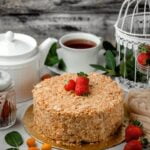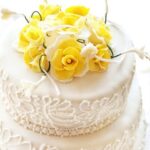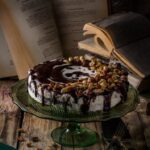Are you an aspiring baker looking to learn how to decorate a cake with buttercream for beginners? Buttercream decorating is a popular and versatile technique that can elevate the appearance of any homemade or store-bought cake. In this article, we will guide you through the process of understanding the basics of buttercream decorating, from essential tools and ingredients to step-by-step techniques for creating beautiful designs on your cakes.
Buttercream, a creamy and smooth icing made from butter, powdered sugar, and flavorings, is the perfect medium for cake decorating. Whether you’re a beginner or have some experience with cake decorating, mastering the art of buttercream decoration can open up a world of creative possibilities. From simple rosettes and swirls to intricate floral designs and patterns, there is no limit to what you can achieve with buttercream.
In this comprehensive guide, we will provide you with all the information you need to get started on your buttercream decorating journey. We’ll walk you through the essential tools and ingredients needed for buttercream cake decorating, as well as provide a step-by-step guide to preparing and coloring your buttercream. So, grab your piping bags and get ready to unleash your creativity with our beginner-friendly tips and techniques for mastering the art of buttercream cake decoration.
Essential Tools and Ingredients for Buttercream Cake Decorating
When it comes to decorating a cake with buttercream, having the right tools and ingredients is essential for creating beautiful and professional-looking designs. For beginners, it’s important to gather the necessary items before getting started. The essential tools for buttercream cake decorating include piping bags, different piping tips, offset spatula, turntable, and bench scraper. These tools will help you achieve different textures and patterns on your cake.
In addition to the tools, having the right ingredients is crucial for making delicious and smooth buttercream. Some of the essential ingredients for buttercream cake decorating include unsalted butter, confectioners’ sugar, vanilla extract, heavy cream or milk, and food coloring if you want to add color to your frosting. It’s important to use good quality ingredients to ensure that your buttercream has the right consistency and flavor.
As a beginner learning how to decorate a cake with buttercream for the first time, investing in these essential tools and ingredients will set you up for success. With the right equipment and high-quality supplies at hand, you’ll be ready to move on to the next steps in preparing and coloring your buttercream as well as mastering basic piping techniques. Remember that having the right tools and ingredients is the foundation of creating beautifully decorated cakes with buttercream.
Step-by-Step Guide to Preparing and Coloring Buttercream
Buttercream is a versatile and delicious frosting that can be used for various cake decorating techniques. For beginners, it’s important to understand the basics of preparing and coloring buttercream to achieve the perfect consistency and color for your cake decorating project. Here’s a step-by-step guide on how to prepare and color buttercream for cake decorating.
First, you’ll need to gather the essential ingredients and tools for making buttercream. This includes butter, powdered sugar, vanilla extract, and a stand or hand mixer. Once you have all the ingredients ready, start by creaming the softened butter in a mixing bowl until it becomes smooth and creamy. Gradually add in the powdered sugar, followed by the vanilla extract, and continue mixing until everything is well combined.
After preparing the basic buttercream base, it’s time to add color to your frosting. Gel food colors are recommended for tinting buttercream as they are more concentrated and won’t affect the consistency of the frosting. Start with a small amount of gel food color and mix it into the buttercream using a spatula or mixer. Add more color as needed to achieve your desired shade, keeping in mind that the color will deepen over time as it sits.
Following this step-by-step guide will ensure that you have perfectly prepared and colored buttercream for decorating your cake. Whether you’re going for a vibrant rainbow design or a subtle pastel palette, understanding how to prepare and color buttercream is essential for creating beautifully decorated cakes – especially if you’re just starting out as a beginner in cake decorating.
Basic Buttercream Piping Techniques
Once you’ve mastered the art of preparing and coloring buttercream, it’s time to move on to the fun part – piping. Piping is the technique of applying buttercream onto a cake in various patterns and shapes using a piping bag and different tips. In this section, we’ll dive into the basics of buttercream piping techniques such as rosettes, swirls, and stars.
Preparing Your Piping Bag and Tips
Before you start piping, ensure that your piping bag is fitted with the desired tip. For rosettes and swirls, a large open star tip is commonly used, while for stars or dots, a small round tip is ideal. Fill the piping bag with prepared buttercream, making sure not to overfill it. Twist the top of the bag to secure the buttercream inside and gently squeeze to eliminate any air pockets.
Piping Rosettes
To create rosettes, hold the piping bag at a 90-degree angle above the cake surface. Squeeze out a small amount of buttercream while keeping a steady pressure as you move in a circular motion from the center outwards. Release pressure and quickly pull up to form a delicate rosette shape. Practice on parchment paper before attempting on your cake for better control.
Piping Swirls and Stars
For swirls and stars, simply apply even pressure on the piping bag while moving in a swirling motion for swirls or in quick bursts for stars. Start with an even amount of pressure and maintain a consistent speed to achieve uniform shapes. Once you’ve gotten comfortable with these basic piping techniques, you can experiment with different tips and variations to create beautiful designs on your cakes.
With these simple guidelines for basic buttercream piping techniques, beginners can enhance their cake decorating skills significantly. With practice, patience, and creativity there’s no limit to what can be achieved when learning how to decorate a cake with buttercream for beginners.
Creating Borders and Edges With Buttercream
Choosing the Right Piping Tips
When it comes to creating borders and edges with buttercream, it’s important to have the right piping tips on hand. For beginners, a simple round tip is a great place to start. This tip allows for easy and clean lines, perfect for outlining the top and bottom edges of your cake. You can also experiment with star tips for a more textured look or petal tips for a softer, ruffled edge.
Techniques for Perfect Borders
To create a border around the top and bottom edges of your cake, start by holding the piping bag at a 90-degree angle to the surface of the cake. Squeeze gently and apply even pressure as you pipe a continuous line around the edge of the cake. For added precision, you can use a turntable to rotate the cake while piping. Practice makes perfect, so don’t be discouraged if your first attempts are not flawless.
Adding Edging Details
Once you’ve mastered basic borders, you can explore adding decorative elements to enhance your cake design. Try using different piping tips to create scalloped edges, beaded borders, or lace-like designs. Experiment with varying pressure on the piping bag to achieve different effects. Remember that mistakes are part of the learning process, so don’t be afraid to try new techniques and get creative with your buttercream borders and edges.
Adding Textures and Patterns With Buttercream
If you have mastered the basic buttercream piping techniques, it’s time to take your cake decorating skills to the next level by adding textures and patterns with buttercream. This will give your cakes a professional and intricate look that will impress your friends and family. Here are some simple techniques to create stunning textures and patterns using buttercream:
- Stripes: To create stripes on your cake, use a piping bag fitted with a round tip and pipe parallel lines across the cake’s surface. You can use different colors of buttercream to create colorful stripes or stick to one color for a more elegant look.
- Ruffles: Ruffles add a beautiful texture to cakes and are surprisingly easy to achieve. Using a petal tip in your piping bag, pipe small overlapping arcs along the edge of the cake, working from the bottom up.
- Lace: For a delicate and romantic touch, you can pipe lace patterns onto your cake using a small round tip. You can find lace templates online to use as a guide or practice freehand for a more unique look.
Once you have mastered these techniques, don’t be afraid to experiment with different designs and patterns. Remember that practice makes perfect, so keep challenging yourself with new ideas.
In addition to adding textures and patterns with buttercream, consider incorporating other decorative elements such as edible pearls, sprinkles, or edible flowers for an extra special touch. Just remember that less is often more when it comes to cake decoration, so be mindful not to overcrowd your design. With time and patience, you’ll soon become an expert at creating beautiful buttercream textures and patterns on your cakes.
Using Buttercream to Pipe Flowers and Decorative Elements
Once you have mastered the basic buttercream piping techniques, it’s time to take your cake decorating skills to the next level by learning how to pipe flowers and other decorative elements. With a little practice and patience, you can create stunning floral designs and intricate details that will elevate your cakes to a whole new level.
To get started, here are some essential tools and ingredients you’ll need for piping flowers and decorative elements with buttercream:
- Piping bags
- Piping tips: small round tips for flower petals, leaf tips for leaves, and star tips for other decorative elements
- Buttercream in different colors (prepared using the step-by-step guide in section 3)
- Practice board or parchment paper for practicing your piping skills
Here’s a step-by-step guide on how to use buttercream to pipe flowers and decorative elements:
- Start by filling your piping bag with the desired color of buttercream using the appropriate piping tip.
- For flowers, begin by piping a small dot in the center as the base, then add small dollops around the base to create petals.
- To pipe leaves, use a leaf tip and apply gentle pressure while moving the piping bag in a back-and-forth motion to create realistic leaf shapes.
- You can also use star tips to pipe decorative elements such as stars, swirls, or even intricate lace-like patterns.
With these techniques, you can adorn your cakes with beautiful floral arrangements, delicate leaves, and charming decorative details that will impress your friends and family. Remember that practice makes perfect when it comes to piping flowers and decorative elements with buttercream. Keep experimenting with different tips and colors to create unique designs that showcase your newfound buttercream decorating skills.
Tips and Tricks for Perfecting Buttercream Cake Decoration
As a beginner in the world of cake decorating, using buttercream can be a great starting point. It’s versatile, easy to work with, and forgiving of mistakes. However, there are some tips and tricks that can help you perfect your buttercream cake decoration skills and take your creations to the next level.
Firstly, ensure that your cake is completely cooled before you start decorating it with buttercream. If the cake is even slightly warm, the butter in the frosting will melt, causing it to slide off the sides of the cake. Additionally, make sure to use a crumb coat – a thin layer of frosting applied to seal in any loose crumbs – before adding your final layer of buttercream. This will give you a smooth base to work with.
When it comes to piping techniques, practice really does make perfect. Start by mastering basic designs such as rosettes, swirls, and stars before moving on to more intricate patterns. Use different piping tips to create various effects and experiment with different pressures on the piping bag. Remember to hold the bag perpendicular to the surface of the cake for best results.
Finally, don’t be afraid to get creative. Experiment with different colors, flavors, and decorations to make your buttercream cakes truly unique. Whether you’re adding edible flowers or creating ombre effects with varying shades of buttercream, don’t be afraid to let your imagination run wild.
| Tips | Tricks |
|---|---|
| Cool cake completely before decorating | Use different piping tips for various effects |
| Practice basic designs before moving on | Get creative with colors and decorations |
Conclusion
In conclusion, learning how to decorate a cake with buttercream for beginners can be a fun and rewarding experience. With the right tools, ingredients, and techniques, anyone can create beautiful and professional-looking cakes right at home.
By following the step-by-step guide to preparing and coloring buttercream, mastering basic piping techniques like rosettes, swirls, and stars, creating borders and edges, adding textures and patterns, and even piping flowers and decorative elements, you will have the skills needed to take your cake decorating to the next level.
Remember that practice makes perfect when it comes to buttercream cake decorating. Don’t be afraid to experiment with different techniques and designs. And always keep in mind the tips and tricks for perfecting buttercream cake decoration that were provided throughout this article. With time and dedication, you’ll be amazed at the stunning creations you can make using just buttercream.
So go ahead, dive into the world of buttercream cake decorating with confidence. Whether it’s for a special occasion or just for fun, there’s no doubt that your newly acquired skills will impress your friends and family. Happy decorating.
Frequently Asked Questions
How Do You Cover a Cake With Buttercream for Beginners?
Covering a cake with buttercream for beginners requires a few key steps. First, ensure your cake is completely cooled before applying the buttercream.
Then, apply a thin layer of buttercream as a “crumb coat” to seal in any crumbs. Once the crumb coat has set, you can apply a thicker layer of buttercream and use an offset spatula to smooth it out for an even finish.
How to Decorate a Cake With Buttercream Frosting?
Decorating a cake with buttercream frosting can be done in various ways, depending on the design you want to achieve. One popular method is using piping bags and different tips to create swirls, flowers, or other decorations. You can also use edible food coloring to tint the buttercream for added visual appeal.
How Do You Spread Buttercream on a Cake?
Spreading buttercream on a cake is best done using an offset spatula or icing smoother. Start by placing a generous dollop of buttercream in the center of the cake and use the spatula to gently spread it outwards towards the edges, being careful not to lift too many crumbs from the surface.
Once the entire top is covered, move on to the sides and continue spreading until smooth.

Welcome to my blog about home and family. This blog is a place where I will share my thoughts, ideas, and experiences related to these important topics. I am a stay-at-home mom with two young children. I hope you enjoy reading it! and may find some helpful tips and ideas that will make your home and family life even better!





